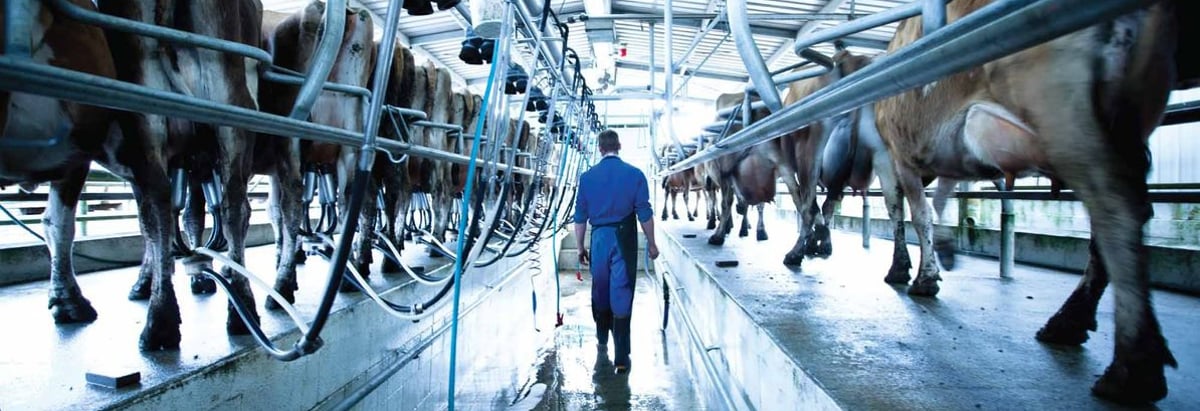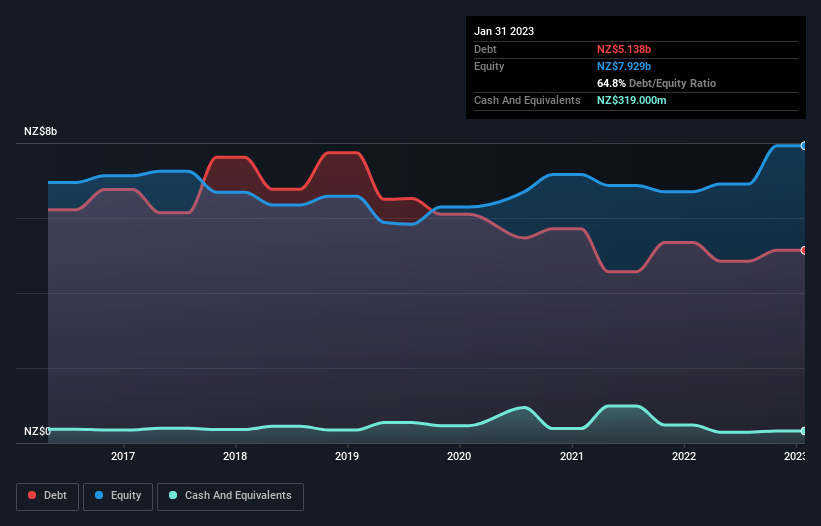- New Zealand
- /
- Food
- /
- NZSE:FCG
Fonterra Co-operative Group (NZSE:FCG) Has A Somewhat Strained Balance Sheet

The external fund manager backed by Berkshire Hathaway's Charlie Munger, Li Lu, makes no bones about it when he says 'The biggest investment risk is not the volatility of prices, but whether you will suffer a permanent loss of capital.' So it might be obvious that you need to consider debt, when you think about how risky any given stock is, because too much debt can sink a company. As with many other companies Fonterra Co-operative Group Limited (NZSE:FCG) makes use of debt. But should shareholders be worried about its use of debt?
When Is Debt Dangerous?
Generally speaking, debt only becomes a real problem when a company can't easily pay it off, either by raising capital or with its own cash flow. If things get really bad, the lenders can take control of the business. However, a more common (but still painful) scenario is that it has to raise new equity capital at a low price, thus permanently diluting shareholders. Of course, plenty of companies use debt to fund growth, without any negative consequences. When we examine debt levels, we first consider both cash and debt levels, together.
View our latest analysis for Fonterra Co-operative Group
How Much Debt Does Fonterra Co-operative Group Carry?
The chart below, which you can click on for greater detail, shows that Fonterra Co-operative Group had NZ$5.14b in debt in January 2023; about the same as the year before. However, it does have NZ$319.0m in cash offsetting this, leading to net debt of about NZ$4.82b.

A Look At Fonterra Co-operative Group's Liabilities
We can see from the most recent balance sheet that Fonterra Co-operative Group had liabilities of NZ$9.82b falling due within a year, and liabilities of NZ$3.65b due beyond that. Offsetting this, it had NZ$319.0m in cash and NZ$2.92b in receivables that were due within 12 months. So it has liabilities totalling NZ$10.2b more than its cash and near-term receivables, combined.
This deficit casts a shadow over the NZ$4.63b company, like a colossus towering over mere mortals. So we definitely think shareholders need to watch this one closely. At the end of the day, Fonterra Co-operative Group would probably need a major re-capitalization if its creditors were to demand repayment.
In order to size up a company's debt relative to its earnings, we calculate its net debt divided by its earnings before interest, tax, depreciation, and amortization (EBITDA) and its earnings before interest and tax (EBIT) divided by its interest expense (its interest cover). Thus we consider debt relative to earnings both with and without depreciation and amortization expenses.
With a debt to EBITDA ratio of 2.2, Fonterra Co-operative Group uses debt artfully but responsibly. And the alluring interest cover (EBIT of 7.6 times interest expense) certainly does not do anything to dispel this impression. Pleasingly, Fonterra Co-operative Group is growing its EBIT faster than former Australian PM Bob Hawke downs a yard glass, boasting a 115% gain in the last twelve months. There's no doubt that we learn most about debt from the balance sheet. But you can't view debt in total isolation; since Fonterra Co-operative Group will need earnings to service that debt. So when considering debt, it's definitely worth looking at the earnings trend. Click here for an interactive snapshot.
Finally, while the tax-man may adore accounting profits, lenders only accept cold hard cash. So we always check how much of that EBIT is translated into free cash flow. In the last three years, Fonterra Co-operative Group's free cash flow amounted to 46% of its EBIT, less than we'd expect. That weak cash conversion makes it more difficult to handle indebtedness.
Our View
Neither Fonterra Co-operative Group's ability to handle its total liabilities nor its net debt to EBITDA gave us confidence in its ability to take on more debt. But the good news is it seems to be able to grow its EBIT with ease. When we consider all the factors discussed, it seems to us that Fonterra Co-operative Group is taking some risks with its use of debt. So while that leverage does boost returns on equity, we wouldn't really want to see it increase from here. When analysing debt levels, the balance sheet is the obvious place to start. But ultimately, every company can contain risks that exist outside of the balance sheet. Case in point: We've spotted 2 warning signs for Fonterra Co-operative Group you should be aware of.
If, after all that, you're more interested in a fast growing company with a rock-solid balance sheet, then check out our list of net cash growth stocks without delay.
New: AI Stock Screener & Alerts
Our new AI Stock Screener scans the market every day to uncover opportunities.
• Dividend Powerhouses (3%+ Yield)
• Undervalued Small Caps with Insider Buying
• High growth Tech and AI Companies
Or build your own from over 50 metrics.
Have feedback on this article? Concerned about the content? Get in touch with us directly. Alternatively, email editorial-team (at) simplywallst.com.
This article by Simply Wall St is general in nature. We provide commentary based on historical data and analyst forecasts only using an unbiased methodology and our articles are not intended to be financial advice. It does not constitute a recommendation to buy or sell any stock, and does not take account of your objectives, or your financial situation. We aim to bring you long-term focused analysis driven by fundamental data. Note that our analysis may not factor in the latest price-sensitive company announcements or qualitative material. Simply Wall St has no position in any stocks mentioned.
About NZSE:FCG
Fonterra Co-operative Group
Fonterra Co-operative Group Limited, together with its subsidiaries, collects, manufactures, and sells milk and milk-derived products.
Good value with adequate balance sheet and pays a dividend.
Similar Companies
Market Insights
Community Narratives



